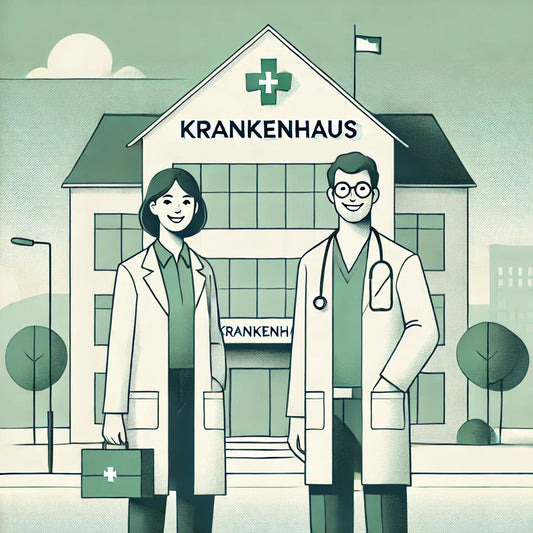Germany is on the brink of a significant transformation in its healthcare system, driven by the much-anticipated Hospital Reform of 2025 (Krankenhausreform 2025). For foreign doctors aspiring to practice in Germany or pursue a postgraduate medical career (PG in Germany), this overhaul presents a mix of opportunities and challenges.
The reforms aim to enhance healthcare quality, stabilize hospital operations, and create a more efficient system. However, concerns about hospital closures, job relocations, and accessibility have left many wondering how this impacts their careers as medical doctors in Germany. In this blog, we’ll discuss the reforms, their implications, and actionable steps for foreign doctors aiming to start a medical PG in Germany.
Why Is the Reform Necessary?
- Financial Instability: Many hospitals in Germany are struggling financially, with overcapacity and insufficient funding from federal states.
- Inefficiency: Despite having a high hospital density, one-third of beds remain unoccupied, and the number of hospital stays is disproportionately high compared to other countries.
- Inconsistent Care Quality: The current system often incentivizes unnecessary treatments to meet financial goals, compromising the quality of care.
Key Elements of the Hospital Reform
-
Service Groups (Leistungsgruppen):
Hospitals will be categorized into 65 service groups based on their specializations. Only hospitals with the necessary staff, equipment, and expertise will perform specific treatments. -
Readiness Payment (Vorhaltevergütung):
Hospitals will now receive 60% of funding for maintaining essential services and infrastructure, with 40% tied to actual treatments. This reduces the pressure to prioritize volume over quality. -
Specialization:
Patients may need to travel further for specialized care, but the promise is higher quality and better outcomes. For instance, stroke treatments will focus on hospitals with specialized "Stroke Units." -
Rural Healthcare Support:
Rural hospitals will receive higher subsidies and permanent exemptions to ensure local access to care. Cross-sector care facilities (Level 1i hospitals) will integrate inpatient, outpatient, and nursing care. -
Transformation Fund:
A €25 billion fund from 2026–2035 will support hospital restructuring and modernization.
Impact on Doctors in Germany
Does Germany need Doctors in 2025?
- Growing Demand: Germany faces a shortage of 50,000 doctors, compounded by an aging workforce. Doctors in Germany, especially foreign-trained professionals, will play a vital role in addressing this gap.
- Specialization Pathways: Hospitals will prioritize specialists in fields like surgery, radiology, and internal medicine, creating structured career opportunities.
- Rural Incentives: Hospitals in rural areas are actively hiring, offering additional perks to attract and retain doctors.
Challenges for Foreign Doctors in Germany
- Relocation Risks: Hospital closures or mergers may require doctors to relocate, potentially to rural or less urbanized areas.
- Language Barriers: Achieving C1-level German proficiency is essential for integration and compliance with quality standards.
- Increased Competition: As hospitals focus on specialization, foreign doctors must meet advanced qualifications to stay competitive.
Impact on Patients
- Improved Care Quality: Specialization ensures patients receive the best care in well-equipped facilities with trained staff.
- Potential Accessibility Issues: Rural residents may need to travel further for specialized treatments, although efforts are in place to maintain local healthcare access.
- Financial Concerns: Legally insured patients face an increased financial burden, raising equity concerns compared to privately insured individuals.
Criticisms and Concerns
- Bridge Funding Gaps: Critics warn of unplanned hospital closures due to a lack of transitional funding.
- Inadequate Staffing Focus: The reforms don’t fully address the urgent need for more qualified healthcare staff, risking overburdened workers.
- Inequity in Financing: Statutory health insurance bear the brunt of funding, while private insurance holders contribute less.
Opportunities for Foreign Doctors in Germany
-
Specialization:
Focus on high-demand fields such as surgery, radiology, or internal medicine to align with hospital priorities. -
Rural Opportunities:
Explore roles in rural areas where staffing shortages are severe, offering faster career progression and job security. -
Language Proficiency:
Invest in German language skills, aiming for C1-level proficiency to enhance integration and career prospects. -
Prepare for Relocation:
Be flexible and open to relocating as hospital structures change, particularly during the transition period.
Recommendations for Action
For Foreign Doctors
- Master the Language: Enroll in intensive language courses to reach C1-level German proficiency.
- Focus on Specialization: Choose a specialization that aligns with the performance group criteria of hospitals.
- Consider Rural Areas: Target rural hospitals offering incentives and opportunities for career growth.
- Stay Updated: Monitor developments in the hospital reform to anticipate changes and make informed decisions.
Conclusion
The Hospital Reform Germany 2025 is a pivotal moment for the country’s healthcare system. While it addresses critical issues like quality, efficiency, and sustainability, it also introduces uncertainties around hospital closures and staffing.
For foreign doctors, these reforms are both a challenge and an opportunity. By focusing on specialization, embracing rural opportunities, and mastering the language, you can be an essential part of this transformation. With preparation and adaptability, a PG in Germany or a career as a doctor in Germany remains a promising path.




